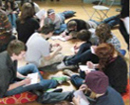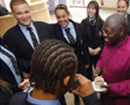|
    
Geography material
- key stage 3
Teachers notes
All the activities on these pages relate to the following areas in the Programme of Study for KS3
Key concepts
1.7 Cultural understanding and diversity
a Appreciating the differences and similarities between people, places, environments and cultures to inform their understanding of societies and economies.
b Appreciating how people's values and attitudes differ and may influence social, environmental, economic and political issues, and developing their own values and attitudes about such issues
Cultural understanding and diversity: Considering how people and places are represented in different ways involves questions such as: Who am I? Where do I come from? Who is my family? Who are the people around me? Where do they come from? What is our story? This contributes to pupils' understanding of diversity and social cohesion.
Key Processes
2.1 Geographical enquiry
Pupils should be able to:
- ask geographical questions, thinking critically, constructively and creatively
- collect, record and display information
- analyse and evaluate evidence, presenting findings to draw and justify conclusions
- find creative ways of using and applying geographical skills and understanding to create new interpretations of place and space
3. Range and Content
This section outlines the breadth of the subject on which teachers should draw when teaching the key concepts and key processes.
The study of geography should include:
- a variety of scales, from personal, local, regional, national, international and continental, to global
- a range of investigations, focusing on places, themes or issues
- the location of places and environments
Particular thanks to Jane Lewis for creating these resources.
|